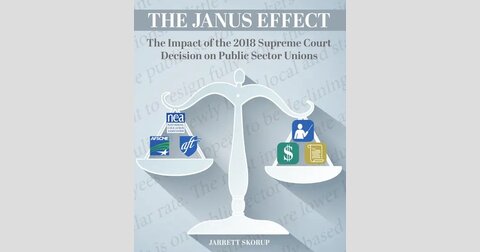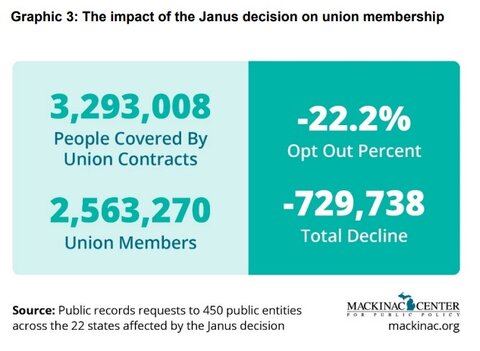5 years after Janus ruling, 22% of government employees opt out of unions
Union coffers down an estimated $733 million; Mackinac Center study offers latest information on ‘Janus Effect’
Five years ago this month, in June 2018, the U.S. Supreme Court ruled in Janus vs. AFSCME that government employees have a First Amendment right to work at their jobs regardless of their union membership.
A new Mackinac Center study, The Janus Effect, examines the effects of the decision in the 22 states affected by the decision. It finds that 22% of government employees in those states opt out of their unions. New hires maintain a similar ratio.
Read it for yourself: The Janus Effect
“We estimate that union revenue is down $733 million annually, based on the estimated 1.2 million government employees who have resigned or declined union membership,” reports Jarrett Skorup, author of the study.
Skorup is vice president of marketing and communications for the Mackinac Center.
The Janus ruling created a nationwide, constitutional right-to-work for government employees, including teachers and police officers. So even when Michigan lawmakers repealed right-to-work this year, government employees were exempt.
The study examines union membership in 22 states, before and after Janus — not including Michigan. At the time of the Janus ruling, Michigan had a right-to-work law, and it applied to government employees.
Michigan Capitol Confidential is the news source produced by the Mackinac Center for Public Policy. Michigan Capitol Confidential reports with a free-market news perspective.



 Rochester school board member sues board over violation of freedom of speech
Rochester school board member sues board over violation of freedom of speech
 2025 brought reforms to earmarks, corporate subsidies, road funding and employer mandates
2025 brought reforms to earmarks, corporate subsidies, road funding and employer mandates
 Michigan loses 36,000 jobs in a year as most states add workers
Michigan loses 36,000 jobs in a year as most states add workers